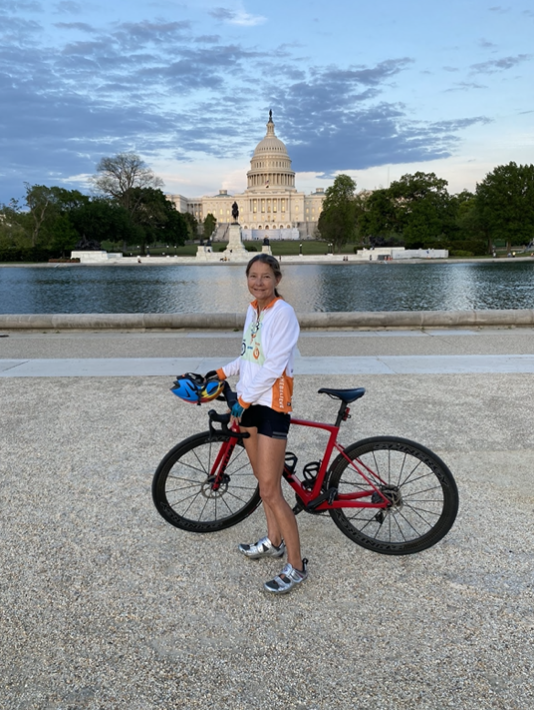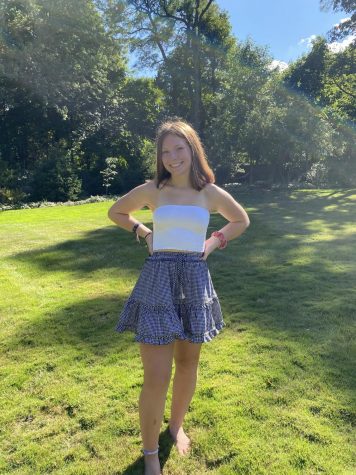One A Day At a Time: Woman with Stage 4 Lung Cancer’s Bike Ride Across America Amid the Pandemic
May 29, 2020
In the blazing San Diego sun, the bike pedals clashing against the bottoms of her shoes, Isabella de la Houssaye, 56, along with her husband Lake Forest Hall of Famer, David Crane began their journey of biking across the United States.
The journey was roughly 3,000 miles and would last 45 days. Except, the journey began on March 10, and was expected to finish on April 25. However, the plan did not go quite as planned: the journey took place in the midst of the chaos surrounding the COVID-19 pandemic, and instead of biking just to Jacksonville, Florida, de la Houssaye and Crane biked back home to Princeton, New Jersey with their final destination being Capitol Hill in Washington D.C.
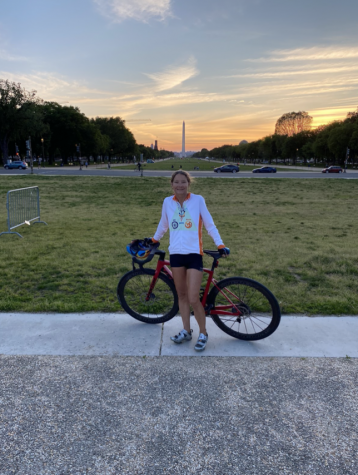
De la Houssaye did not stop her plan to bike across America because of the pandemic. No, she has always been a fighter and has a fire in her that keeps pushing her to new limits and boundaries.
“You know it is going to be a long day and you are going to have to bike for ten hours. You have to settle into those ten hours without being anxious about when it’s going to be over… When your mind starts to say this isn’t fun or that you’re tired, you have to be aware of those negative emotions. You need to be aware they’re there, and be able to redirect them,” said de la Houssaye.
De La Houssaye’s family has the same drive as her and is willing to pursue similar adventures. Her eldest son, David Jr. cycled across Africa in the Tour d’Afrique at 20 years old; her second eldest son, Cason Crane, was the first openly gay mountanieer to climb all Seven Summits; her son Oliver Crane, at 19 years old was the youngest man to row solo 3,000 miles across the Atlantic Ocean in 44 days; the Crane’s daughter, Bella, hiked the Pacific Crest Trail during her gap year before attending Columbia University in New York; and her youngest son, Christopher Crane, an upcoming high school senior who is ranked as one of the top runners for Cross Country and Track & Field in New Jersey.
The Crane family’s many adventures not only proved their athletic ability and stamina, but also allowed them to raise charity for various foundations. For this journey, de la Houssaye raised money for lung cancer awareness.
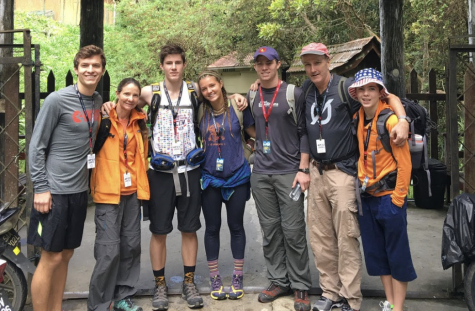
Two years ago, de la Houssaye was diagnosed with stage 4 lung cancer. She was in perfect shape and had never smoked in her life, and she maintained a healthy and mindful lifestyle. Lung cancer can happen to anyone, despite how proactive they may be, because no one is immune to lung cancer.
“When I was your age or younger, breast cancer was a big fear. We would get monthly checks. Yet, you and I are 18 percent more likely to get lung cancer than breast cancer. Yet, there are no screenings for lung cancer,” said de la Houssaye.
In her blog posts, aside from teaching her audience more about mindfulness or sharing more about her inspiring journeys, de la Houssaye hopes to raise awareness of lung cancer. Anyone can contract lung cancer, even the fittest and healthiest athletes such as de la Houssaye can contract the disease. Lung cancer is the leading cause of cancer death in the world; 1 in 16 people in the U.S. can receive a lung cancer diagnosis, with 1 out of 14 men and 1 out of 17 women.
More lives are lost to lung cancer than to coloctoral, breast, or prostate cancers combined. Despite this, research for lung cancer receives the least amount of federal government dollars opposed to other types of cancer research.
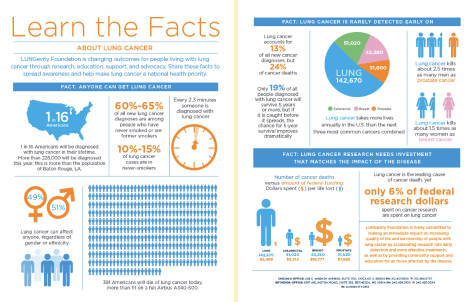
De La Houssaye’s diagnosis did not stop her from continuing her active life. She continued to do what many Americans could only dream of doing, from climbing to the top of Aconcagua in Argentina, to running the marathons with her children, to complete several Ironman triathlons. Nothing has stopped her.
The cross country bike ride across America was not the first bike ride for de la Houssaye. Over the past summer, de la Houssaye biked across Europe and Tazmania, and two years ago, de la Houssaye biked across the U.K. and has even ridden across several countries in Africa.
This trip may have not been her first journey, yet this bike ride differed greatly from any other due to the COVID-19 pandemic.
“When we started there were other people and the intention was to be biking with groups of people.Then, when we found out that wasn’t a safe thing to do, it was just David and myself who continued,” said de la Houssaye.
Towards the beginning of their journey, de la Houssaye and Crane biked around 80 to 85 miles each day due to the mountains and high elevations, and then when the land began to flatten out as they approached the East, they began to bike 100+ miles each day.
“There was a huge difference especially because of the elevation and the way the wind was blowing. Either the wind was blowing with you or against you. And, depending on the surface being flat or not, it can make you go much slower,” said de la Houssaye.
The high elevations and winds were not the sole challenges along the way, as de la Houssaye also had to avoid urban areas due to the high densities of people and the higher probability of contracting COVID-19.
“One of the lessons we learned on our journey was that we were able to see the country in a whole new light. Everybody should be able to do that. We have a fabulous country. Go back to the song “America the Beautiful,” and you’ll begin to understand. When you get off the interstates, you really get to take the time to actually see the less traveled areas, including old highways, old roads, and old interstates. You were truly able to see a whole different America,” said de la Houssaye.
The initial part of de la Houssaye and Crane’s journey ended on April 20 when they reached Jacksonville.. However, de la Houssaye began to rethink whether their journey should end there due to being nervous about traveling back home via air to New Jersey, a hotspot for COVID-19.
“My decision to bike to Princeton was mainly driven by the fact that it was such a COVID hotspot, and it made me nervous going back. It’s complicated, but the COVID map changes everyday where some areas have COVID spreading quickly and other areas are starting to have fewer cases. It’s difficult to figure out,” said de la Houssaye.
At the end of her and her husband’s journey, de la Houssaye marveled at the lessons she learned along the way, including acceptance and taking one step at a time. On her website, de la Houssaye chronicled her journey each day along with mindfulness tips for her audience on how to carry on with life in the eyes of a challenge.
“That’s the big life lesson, the best made plans never turn out the way you expect. You have to accept it for what it is. That was the first thing, having to be okay with what it was.”
In the case of the COVID-19 pandemic, the power of acceptance and filtering ideas in one thought, or one step, at a time were key for de la Houssaye on her journey, because right now in the world, everything is changing and being willing to accept change helped get de la Houssaye through her journey.
“The second thing is you were really only able to plan a day ahead because you were focused on that day. Everyday we had to assess what was the safest thing to do. Whether it was to keep going or not. That was a daily thing because we didn’t want to break any laws. The rules were changing all the time. That was another lesson to just take one step at a time,” said de la Houssaye.
De la Houssaye has made countless journeys in the past few years, whether biking across America, Africa, or scaling the Andes mountains with her daughter. For de la Houssaye, the challenge of having Stage Four lung cancer has a great impact on her life, but it does not stop her from pursuing her passions to travel and her love for adventure.
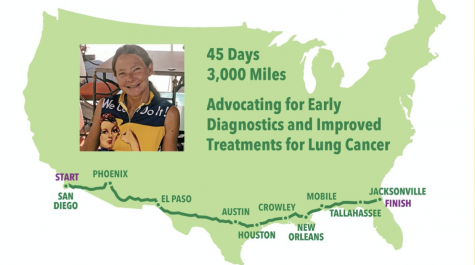
De la Houssaye and the entire Crane family take countless journeys across the world and have an intense amount of wanderlust. Every journey David Crane, Isabella de la Houssaye, and their children take, they raise money and bring awareness to a cause of their choice. Begin to learn more about lung cancer and help bring awareness to this underfunded type of cancer to make de la Houssaye and Crane’s cross country bike across America teach not only lessons to the duo about acceptance, but to teach a few lessons to their audience as well. To make the journeys that de la Houssaye and her family take count,
To learn more about lung cancer visit: https://lungevity.org/for-supporters-advocates/lung-cancer-statistics
To learn more about de la Houssaye and her journey visit: https://bikebreathebelieve.org/

